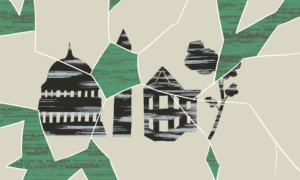Dear readers,
We here at the Voice have spent much of the last year saying, “We cannot return to campus the same as we left.”
This statement is fundamentally true. Two classes of writers, editors, designers, photographers, and podcasters have graduated. We’ve said goodbye to three of our former editors-in-chief. The newsroom I walked into in 2018 has entirely disappeared, replaced by equally talented—but unmistakably different—reporters.
We’ve also spent the last year and a half questioning what it means to be a news magazine that does not print, solidifying our belief that we will not let print die on this campus. There is something about holding the work in your hands that cannot be replicated by posting a story online, no matter how well-written or groundbreaking it is. Though we have challenged ourselves to work with an online medium, we are so thankful to be back on stands this August.
But these are the changes we were forced into. Throughout the course of the pandemic, we have come together as a board to decide to alter who we are, who we serve, and what our role in the Georgetown and D.C. community is, and I want to share that with our readers.
The Voice believes that all journalism should be community journalism. Our decision to take on the moniker of journalist—even on a college campus—brings about responsibility: One to tell the truth, yes, but also to not harm our community, to uplift our readers, to question power structures, to continue to educate ourselves, and to serve not our desires or professional aspirations, but our readers’ needs. While we do take advantage of our platform to inform and entertain, we believe the bulk of what we do must aid our community.
To that end, we have implemented several internal changes over the last year. First, we recognize both the racism of the industry we operate in and our own past and very recent failures to cover communities of color in a compassionate and non-tokenizing manner. We remain a heavily white and non-Black organization, and this both limits us and deeply concerns me. Our demographics make addressing the intersection of race and journalism all the more important.
To facilitate this, we added a board position dedicated to this effort, the Executive Editor for Resources, Diversity, and Inclusion. This individual has the latitude and capacity to make both system-level and micro-level changes to how the Voice operates so that it might be a more inclusive and antiracist organization.
Since last summer, we have hosted reflective conversations to address race and inclusion, including five organization-wide conversations and over a dozen section-specific conversations. It’s now a requirement for each section to host two events centered around race each semester and for board members to attend, and we plan to continue holding spaces Voice-wide. These conversations typically focus on race-conscious coverage, how racism manifests in writing, and tools to strive towards anti-racism in our newsroom. We have tried to move from more abstract conversations about trends to developing tangible line-items we can commit to implementing. Editors are expected to consider the racial elements of every article, ensure writers are including the perspectives of non-white students regardless of the topic, and pitch pieces that feature the totality of people of color, not solely spotlighting narratives of violence or oppression. In the coming semester, we will develop guides for race-conscious reporting and tools to track our racial demographics, and we hope to see our organization diversify.
I recognize this is the bare minimum—something the Voice should have done years ago. This list is not meant to be congratulatory, only transparent. We are still much whiter than any organization who proclaims inclusivity should be. But we are making a commitment to strive to be more anti-racist and to minimize harm to communities of color, including our writers, friends, and classmates.
It’s also become clear to us that we have lacked the tools and culture to report on experiences of trauma–most notably sexual violence–in truly compassionate and trauma-informed manners. Though we are still at the beginning of addressing this, we have crafted a trauma-informed guide which stresses how to care for survivors and empower their narratives. We are working to organize trainings to further equip writers, at least one of which will occur each semester, and added a new position to the board to oversee this: the Editor for Sexual Violence Advocacy, Prevention, and Coverage.
The last year has featured a debate about the role of journalists in community activism and service. Though we believe reporters should be wary of conflicts of interest, as an organization we choose to explicitly express our values of radical justice, anti-racism, trauma-informed reporting, and empathetic and considerate journalism, as can be seen in our revamped mission statement.
Care for community also means action, and over the last year we have tried to engage in this work through two donation matching campaigns. To make these efforts more comprehensive, and proactive rather than reactionary, we created the position of our Service Chair to engage with the community we report on and organize service days in D.C. We hope to work with mutual aid groups to use our platform and form long-term partnerships with anti-poverty organizations.
Our greatest resource is our coverage, and we are pledging to dedicate that to our community as well. In the last year, we added a series intended to provide knowledge students need, Georgetown Explained. We also added a new tab to our site labeled “Resources,” which will feature information to help students access resources on and off campus, learn about their community, and generally make life easier.
Finally, we are committed to prioritizing people. This means writing stories that our readers want to see, and caring for our sources, who often are also our classmates and neighbors. In a new internal ethics guide, we have committed to putting the person before the story, detailed how to exhibit care for those we write about, and put forth all the above principles as a part of our core values.
It also means I would love to hear from you all; your ideas, your feedback on our organization, what you hope to see covered, and where we are falling short. Please reach out to me (editor@georgetownvoice.com) at any time with complaints, concerns, pitches, or thoughts. We aim to serve you, and would be so grateful to know how we are doing.
I will never pretend we are an organization devoid of problems. I cannot blame anyone who is skeptical of us or our industry, and I will not try to convince anyone otherwise. There have been days when I was skeptical myself.
But I am so glad I can announce we have made these changes, late and simple as they are. I’m so proud of my staff for embracing them, pushing for them, and spending time trying to educate and better themselves. Though we have a great deal more to grow, we are better than who we were, and that is nothing short of a relief.
So, if you’ve read us before, I hope you will see an improvement this year. If you’re new, this is who we are, and we will be upfront about it. And, if you’ve ever wanted to be part of our organization, this is who you’ll be joining. We are a trying, sometimes failing, but committed group, and we would love to have you, if you’ll have us.
Thanks for reading,
Annemarie







